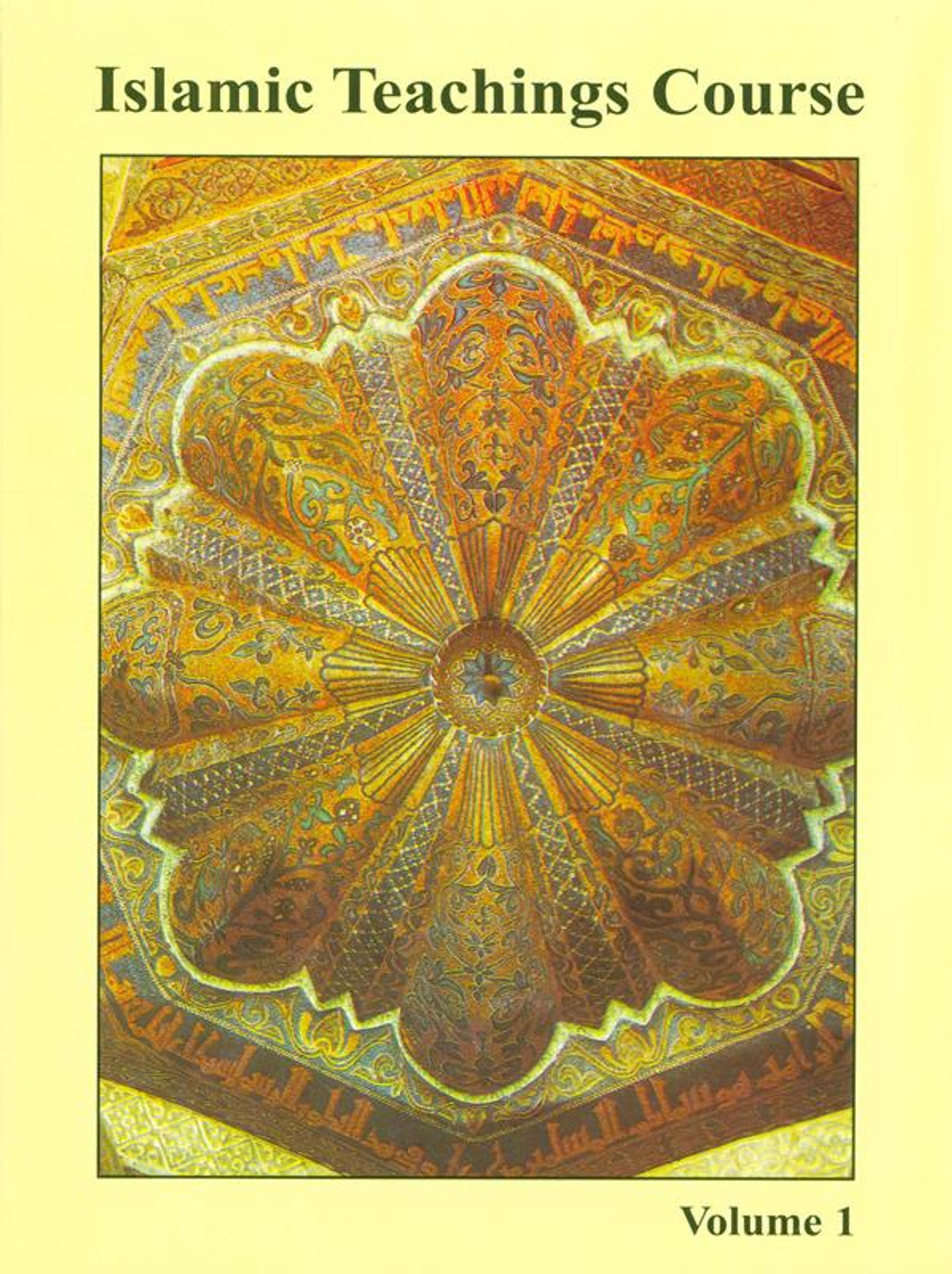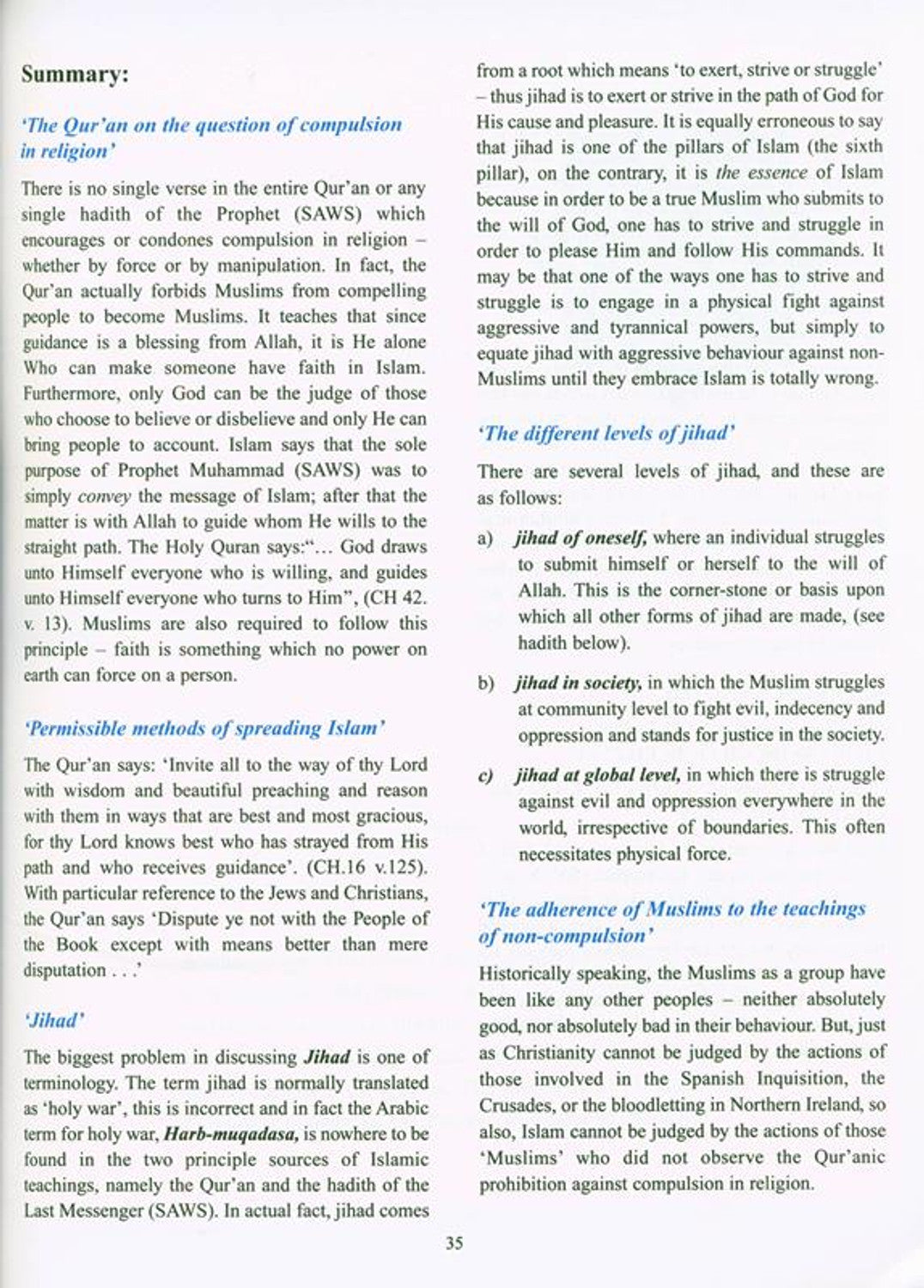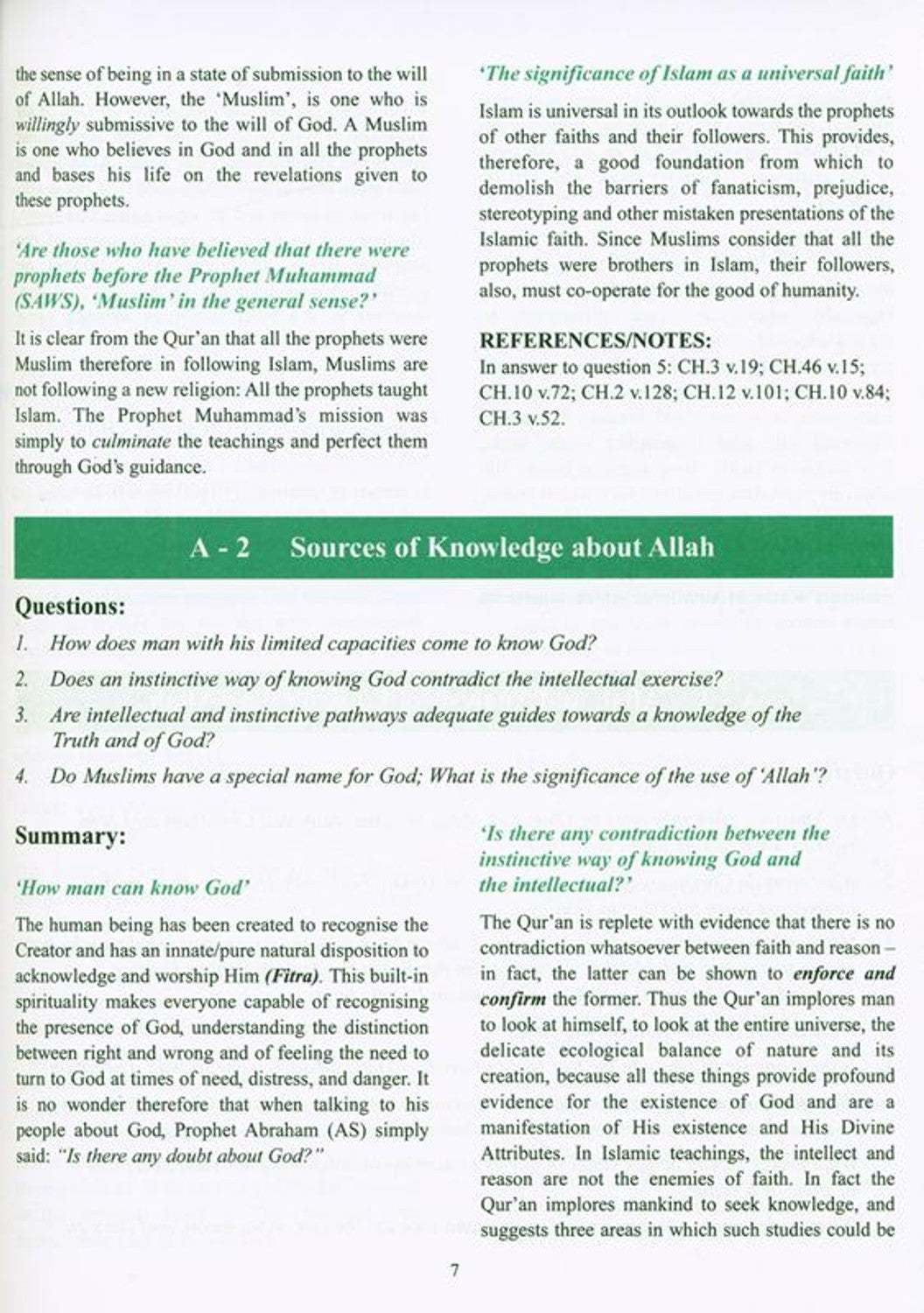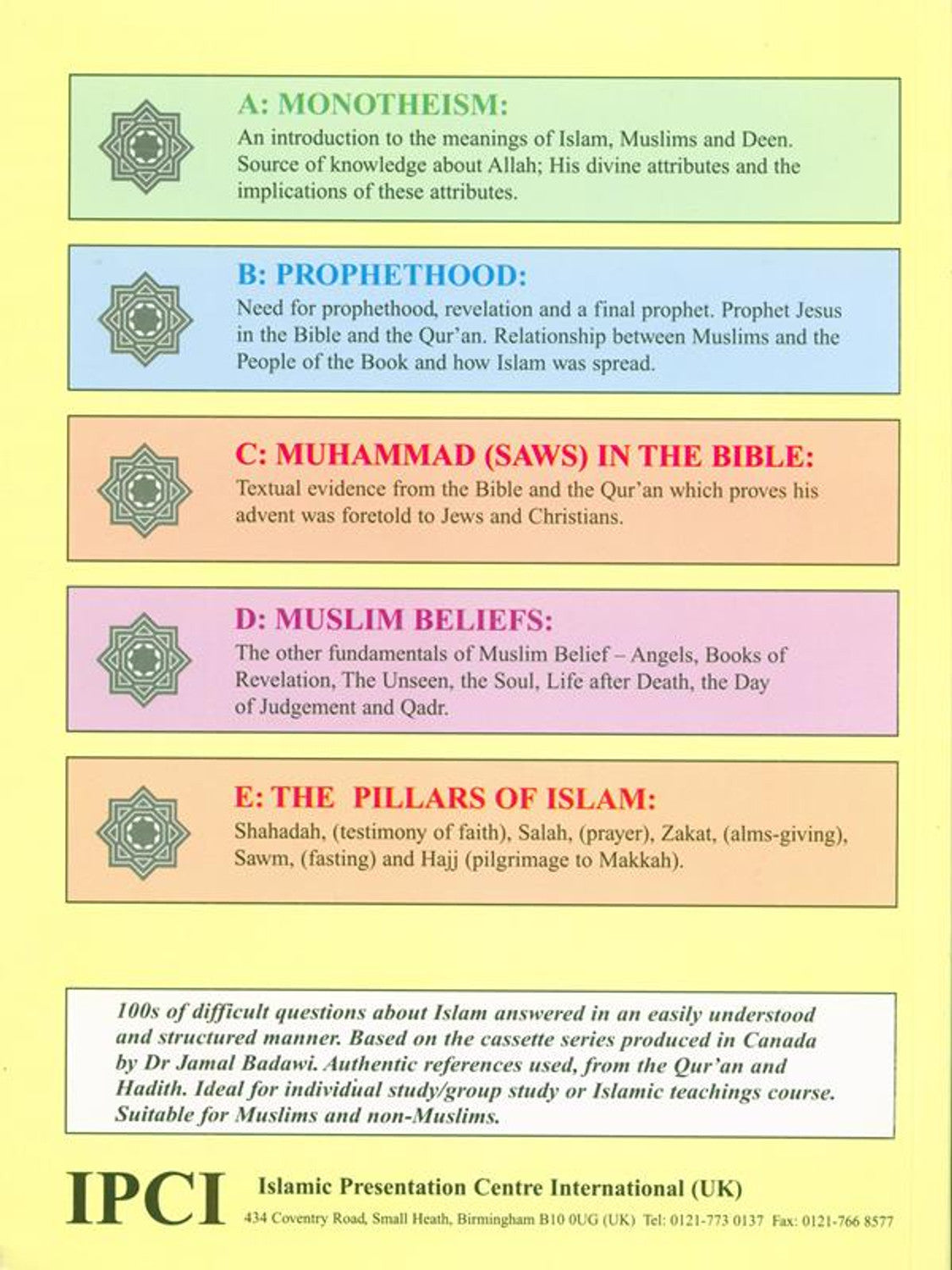Islamic Teachings Course: Volume 1 by Jamal A Badawi
Islamic Teachings Course: Volume 1 by Jamal A Badawi
Paper back
Paper back
Author :
- Jamal A Badawi
Publisher:
- Goodword
Book Size:
- 18x25 cm
Binding:
- Paper back
- Islamic Books
Couldn't load pickup availability
Islamic Teachings Course: Volume 1 by Jamal A Badawi
The Islamic Teachings Course: Volume 1 by Jamal A. Badawi is an insightful and structured guide designed to introduce readers to the fundamental teachings of Islam. This book serves as the first volume in a comprehensive series aimed at providing a clear understanding of Islamic beliefs, practices, and values in an organized and accessible manner.




Collapsible content
Author Details
- Jamal A Badawi
Publisher Details
Sample Pages - Content
Islamic Teachings CourseVolume 1
2-Summary:'The Qur'an on the question of compulsion in religion'There is no single verse in the entire Qur'an or any single hadith of the Prophet (SAWS) which encourages or condones compulsion in religion- whether by force or by manipulation. In fact, the Qur'an actually forbids Muslims from compelling people to become Muslims. It teaches that since guidance is a blessing from Allah, it is He alone Who can make someone have faith in Islam. Furthermore, only God can be the judge of those who choose to believe or disbelieve and only He can bring people to account. Islam says that the sole purpose of Prophet Muhammad (SAWS) was to simply convey the message of Islam; after that the matter is with Allah to guide whom He wills to the straight path. The Holy Quran says:"... God draws unto Himself everyone who is willing, and guides unto Himself everyone who turns to Him", (CH 42. v. 13). Muslims are also required to follow this principle faith is something which no power on earth can force on a person.'Permissible methods of spreading Islam'The Qur'an says: 'Invite all to the way of thy Lord with wisdom and beautiful preaching and reason with them in ways that are best and most gracious, for thy Lord knows best who has strayed from His path and who receives guidance'. (CH.16 v.125). With particular reference to the Jews and Christians, the Qur'an says 'Dispute ye not with the People of the Book except with means better than mere disputation...'Jihad'The biggest problem in discussing Jihad is one of terminology. The term jihad is normally translated as 'holy war', this is incorrect and in fact the Arabic term for holy war, Harb-muqadasa, is nowhere to be found in the two principle sources of Islamic teachings, namely the Qur'an and the hadith of the Last Messenger (SAWS). In actual fact, jihad comes35from a root which means 'to exert, strive or struggle' - thus jihad is to exert or strive in the path of God for His cause and pleasure. It is equally erroneous to say that jihad is one of the pillars of Islam (the sixth pillar), on the contrary, it is the essence of Islam because in order to be a true Muslim who submits to the will of God, one has to strive and struggle in order to please Him and follow His commands. It may be that one of the ways one has to strive and struggle is to engage in a physical fight against aggressive and tyrannical powers, but simply to equate jihad with aggressive behaviour against non- Muslims until they embrace Islam is totally wrong.'The different levels of jihad'There are several levels of jihad, and these are as follows:a) jihad of oneself, where an individual struggles to submit himself or herself to the will of Allah. This is the corner-stone or basis upon which all other forms of jihad are made, (see hadith below).b) jihad in society, in which the Muslim struggles at community level to fight evil, indecency and oppression and stands for justice in the society. c) jihad at global level, in which there is struggle against evil and oppression everywhere in the world, irrespective of boundaries. This often necessitates physical force.'The adherence of Muslims to the teachings of non-compulsion'Historically speaking, the Muslims as a group have been like any other peoples- neither absolutely good, nor absolutely bad in their behaviour. But, just as Christianity cannot be judged by the actions of those involved in the Spanish Inquisition, the Crusades, or the bloodletting in Northern Ireland, so also, Islam cannot be judged by the actions of those 'Muslims' who did not observe the Qur'anic prohibition against compulsion in religion.
3-the sense of being in a state of submission to the will of Allah. However, the 'Muslim', is one who is willingly submissive to the will of God. A Muslim is one who believes in God and in all the prophets and bases his life on the revelations given to these prophets."Are those who have believed that there were prophets before the Prophet Muhammad (SAWS), 'Muslim' in the general sense?'It is clear from the Qur'an that all the prophets were Muslim therefore in following Islam, Muslims are not following a new religion: All the prophets taught Islam. The Prophet Muhammad's mission was simply to culminate the teachings and perfect them through God's guidance.'The significance of Islam as a universal faith' Islam is universal in its outlook towards the prophets of other faiths and their followers. This provides, therefore, a good foundation from which to demolish the barriers of fanaticism, prejudice, stereotyping and other mistaken presentations of the Islamic faith. Since Muslims consider that all the prophets were brothers in Islam, their followers, also, must co-operate for the good of humanity.REFERENCES/NOTES:In answer to question 5: CH.3 v.19; CH.46 v.15; CH.10 v.72; CH.2 v.128; CH.12 v.101; CH.10 v.84; CH.3 v.52.A-2Sources of Knowledge about AllahQuestions:1. How does man with his limited capacities come to know God?2. Does an instinctive way of knowing God contradict the intellectual exercise?3. Are intellectual and instinctive pathways adequate guides towards a knowledge of the Truth and of God?4. Do Muslims have a special name for God; What is the significance of the use of 'Allah"?Summary:'How man can know God'The human being has been created to recognise the Creator and has an innate/pure natural disposition to acknowledge and worship Him (Fitra). This built-in spirituality makes everyone capable of recognising the presence of God, understanding the distinction between right and wrong and of feeling the need to turn to God at times of need, distress, and danger. It is no wonder therefore that when talking to his people about God, Prophet Abraham (AS) simply said: "Is there any doubt about God?"7'Is there any contradiction between the instinctive way of knowing God and the intellectual?'The Qur'an is replete with evidence that there is no contradiction whatsoever between faith and reason- in fact, the latter can be shown to enforce and confirm the former. Thus the Qur'an implores man to look at himself, to look at the entire universe, the delicate ecological balance of nature and its creation, because all these things provide profound evidence for the existence of God and are a manifestation of His existence and His Divine Attributes. In Islamic teachings, the intellect and reason are not the enemies of faith. In fact the Qur'an implores mankind to seek knowledge, and suggests three areas in which such studies could be.
4-A: MONOTHEISM:An introduction to the meanings of Islam, Muslims and Deen. Source of knowledge about Allah; His divine attributes and the implications of these attributes.B: PROPHETHOOD:Need for prophethood, revelation and a final prophet. Prophet Jesus in the Bible and the Qur'an. Relationship between Muslims and the People of the Book and how Islam was spread.C: MUHAMMAD (SAWS) IN THE BIBLE: Textual evidence from the Bible and the Qur'an which proves his advent was foretold to Jews and Christians.D: MUSLIM BELIEFS:The other fundamentals of Muslim Belief - Angels, Books of Revelation, The Unseen, the Soul, Life after Death, the Day of Judgement and Qadr.E: THE PILLARS OF ISLAM:Shahadah, (testimony of faith), Salah, (prayer), Zakat, (alms-giving), Sawm, (fasting) and Hajj (pilgrimage to Makkah).100s of difficult questions about Islam answered in an easily understood and structured manner. Based on the cassette series produced in Canada by Dr Jamal Badawi. Authentic references used, from the Qur'an and Hadith. Ideal for individual study/group study or Islamic teachings course. Suitable for Muslims and non-Muslims.IPCIIslamic Presentation Centre International (UK)434 Coventry Road, Small Heath, Birmingham B10 OUG (UK) Tel: 0121-773 0137 Fax: 0121-766 8577




